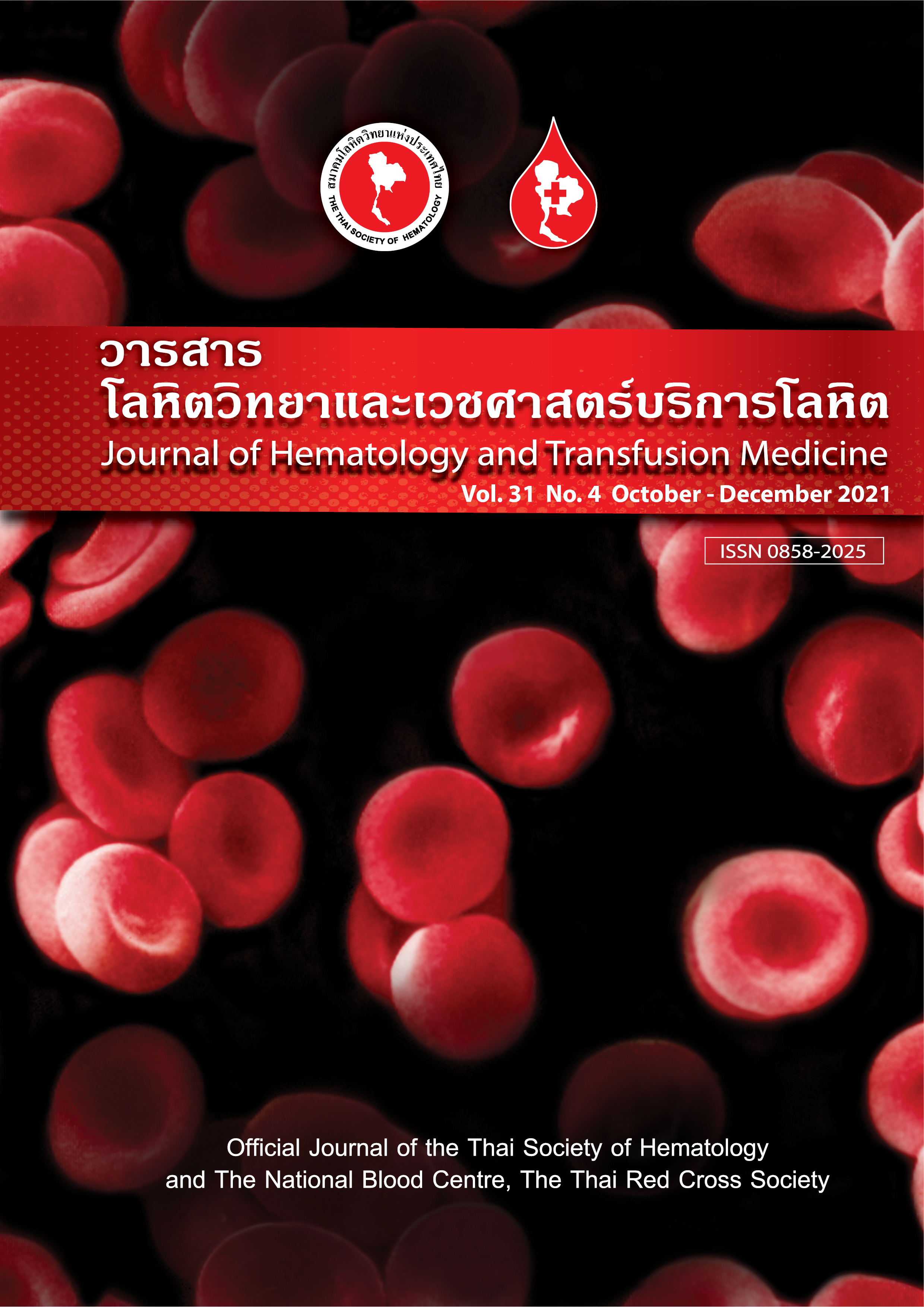Retrospective Study of Efficacy and Safety of Various Salvage Chemotherapy Regimens in Relapsed or Refractory Lymphoma
Keywords:
Relapse lymphoma, Refractory lymphoma, Salvage chemotherapyAbstract
Background: Relapsed or refractory lymphoma constitutes a poor prognosis. The standard of care involves salvage chemotherapy and autologous hematopoietic stem cell transplantation (ASCT). Choice of salvage chemotherapy depends on the experience and consideration of the physicians.
Objective: The study aimed to compare salvage chemotherapy regimens’ efficacy and side effects in relapsed or refractory lymphoma.
Method: Medical records of patients with relapsed or refractory lymphoma receiving salvage chemotherapy in Srinagarind Hospital, Khon Kaen Province, Thailand from 1 January 2013 to 31 August 2018 were reviewed retrospectively.
Results: Of all 55 patients with relapsed or refractory lymphoma, 23 patients received ESHAP regimen (41.8%), 26 patients received ICE regimen (47.3%), and 6 patients received R-ICE regimens (10.9%). The overall response rate (ORR) was 56.5% for ESHAP, 50% for ICE and 66.7% for R-ICE (p-value = 0.41). Males and normal serum LDH showed statistically significant better ORR (p-value = 0.015 both). No difference was found in adverse events rates. The 1-year overall survival rate (OS) did not differ among the three regimens. Patients with ASCT had significantly higher OS (p-value < 0.01).
Conclusion: ESHAP, ICE and R-ICE regimens did not significantly differ in response rate, 1-year OS and adverse events. ASCT remains a key factor for long term survival among patients relapsed or refractory lymphoma.
Downloads
References
Maurer MJ, Thompson CA, Farooq U, Lin T, Nowakowski GS, Lin Y, et al. Incidence and outcomes of treatment refractory diffuse large B-cell lymphoma in the immunochemotherapy era. Blood. 2015;126:3992.
Raut LS, Chakrabarti PP. Management of relapsed-refractory diffuse large B cell lymphoma. South Asian J Cancer. 2014;3:66-70.
Philip T, Guglielmi C, Hagenbeek A, Somers R, Van der Lelie H, Bron D, et al. Autologous bone marrow transplantation as compared with salvage chemotherapy in relapses of chemotherapy-sensitive non-Hodgkin’s lymphoma. N Engl J Med. 1995;333:1540-5.
Cheson BD, Fisher RI, Barrington SF, Cavalli F, Schwartz LH, Zucca E, et al. Recommendations for initial evaluation, staging, and response assessment of Hodgkin and non-Hodgkin lymphoma: the Lugano classification. J Clin Oncol. 2014;32:3059-68.
Ramzi M, Rezvani A, Dehghani M. GDP versus ESHAP regimen in relapsed and/or refractory Hodgkin lymphoma: a comparison study. Int J Hematol Oncol Stem Cell Res. 2015;9:10-4.
Norasetthada L, Tantiworawit A, Rattanathammethee T, Chai-Adisaksopha C, Chaipoh T, Rattarittamrong E. Efficacy of ESHAP regimen in transplant ineligible patients with relapsed/refractory T-cell lymphoma. Journal of Hematology. 2018;7:131-9.
Gisselbrecht C, Glass B, Mounier N, Singh Gill D, Linch DC, Trneny M, et al. Salvage regimens with autologous transplantation for relapsed large B-cell lymphoma in the rituximab era. J Clin Oncol. 2010;28:4184-90.
Kewalramani T, Zelenetz AD, Nimer SD, Portlock C, Straus D, Noy A, et al. Rituximab and ICE as second-line therapy before autologous stem cell transplantation for relapsed or primary refractory diffuse large B-cell lymphoma. Blood. 2004;103:3684-8.
Hertzberg MS, Crombie C, Benson W, Taper J, Gottlieb D, Bradstock KF. Outpatient fractionated ifosfamide, carboplatin and etoposide as salvage therapy in relapsed and refractory non-Hodgkin’s and Hodgkin’s lymphoma. Ann Oncol. 2006;17(Suppl 4):iv25-30.
Habermann TM. Is rituximab one for all ages and each sex? Blood. 2014;123:602-3.
Pfreundschuh M, Müller C, Zeynalova S, Kuhnt E, Wiesen MHJ, Held G, et al. Suboptimal dosing of rituximab in male and female patients with DLBCL. Blood. 2014;123:640-6.
Horesh N, Horowitz NA. Does gender matter in non-hodgkin lymphoma? Differences in epidemiology, clinical behavior, and therapy. Rambam Maimonides Med J. 2014;5:e0038.
Purnamasidhi CAW, Suega K, Bakta IM. Association between Lactate dehydrogenase levels to the response of non-Hodgkin lymphoma in elderly patients who treated with first-line chemotherapy in Sanglah General Hospital. Open Access Maced J Med Sci. 2019;7:1984-6
Ferraris AM, Giuntini P, Gaetani GF. Serum lactic dehydrogenase as a prognostic tool for non-Hodgkin lymphomas. Blood. 1979;54:928-32.
Schneider RJ, Seibert K, Passe S, Little C, Gee T, Lee BJ, et al. Prognostic significance of serum lactate dehydrogenase in malignant lymphoma. Cancer. 1980;46:139-43.
Philip T, Guglielmi C, Hagenbeek A, Somers R, Van Der Lelie H, Bron D, et al. Autologous bone marrow transplantation as compared with salvage chemotherapy in relapses of chemotherapy-sensitive non-Hodgkin’s lymphoma. N Engl J Med. 1995;333:1540-5.



